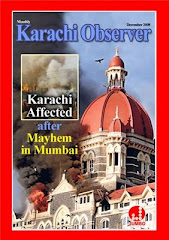* 60 injured, 2 foreigners including Russian UN official among dead

PESHAWAR: A massive truck bomb ripped through the five-star Pearl Continental hotel in Peshawar on Tuesday killing 11 people and wounding 60.
The attackers entered the compound on two vehicles at about 10:30pm, spraying the security guards at the hotel gate with bullets from one and blowing up the other in the hotel parking.
“It was a suicide attack,” city police chief Sefwat Ghayur told AFP. “There are two foreigners among the dead,” provincial information minister Mian Iftikhar Hussain said. He did not reveal their nationalities.
A witness said he first heard shooting and then there was loud bang that left the area in thick smoke. The explosion was followed by a power failure.
Forty vehicles parked in the compound were destroyed and the building was seriously damaged. A large crater was seen in the parking area. A portion of the building was completely destroyed.
The explosion was heard several kilometres away from the site and shook nearby buildings, shattering the windows of many of them.
Khyber Road is a sensitive locality with the NWFP Assembly and several government and military buildings.
A number of foreigners, most of them associated with aid agencies, were staying in the hotel.
UN official: A private TV channel said the dead included UNHCR official Alexander Joseph from Russia. Sixteen other UNHCR officials were injured and one was missing. The injured also included an official from the World Food Programme, another from the World Health Organisation and two from UNICEF, it said. Another TV channel said a foreign female journalist was also injured.
Edhi sources claimed receiving dead bodies of three foreigners.
News channels said that hotel manager Kamal Ahmad was missing. Two PIA hostesses were also injured and a captain was missing.
A Bomb Disposal Squad (BDS) official told reporters at least 500 kilogrammes of explosives were used in the attack.
Police cordoned off the area following the explosion and closed Khyber Road for traffic. The hotel was evacuated and an emergency was imposed in Peshawar’s hospitals.
There were unconfirmed reports that employees of a private American company had hired a portion of the hotel.
The NWFP information minister condemned the attack and told a private TV channel it would not affect his government’s resolve against the Taliban.
Most of the injured were hotel employees and were taken to Lady Reading Hospital.
The Associated Press said US officials were in negotiations to make the premises an American consulate. Citing two senior US officials in Washington, it said the State Department had been in negotiations with the hotel’s owners to either purchase the facility or sign a long-term lease there to house a new American consulate in Peshawar. The officials said they were not aware of any sign that US interest in the compound had played a role in it being targeted.
Lou Fintor, spokesman for the US Embassy in Islamabad, said all diplomatic personnel were accounted for. “At this point we have no reports that any Americans were at the scene,” he said.
President Asif Ali Zardari and Prime Minister Yousuf Raza Gilani condemned the attack and grieved the loss of innocent lives, and resolve to continue the government’s commitment to eradicate terrorism.





















